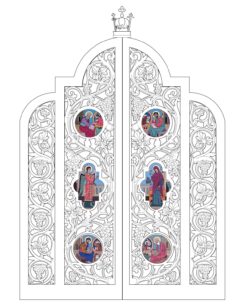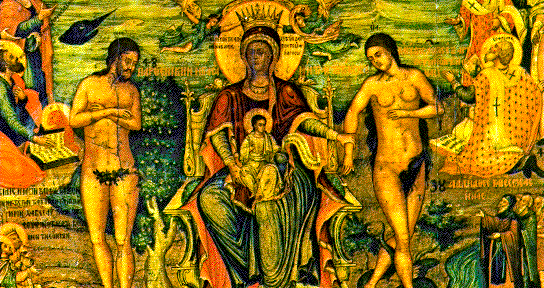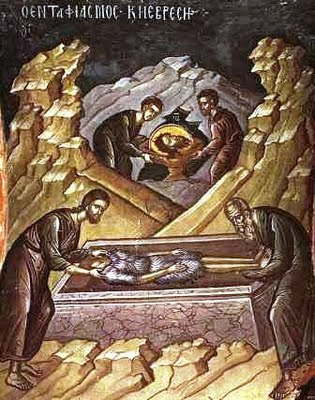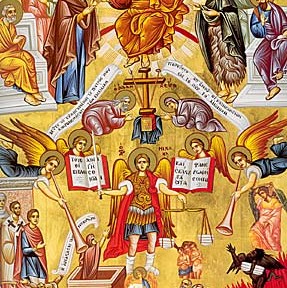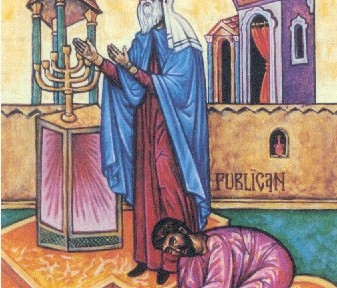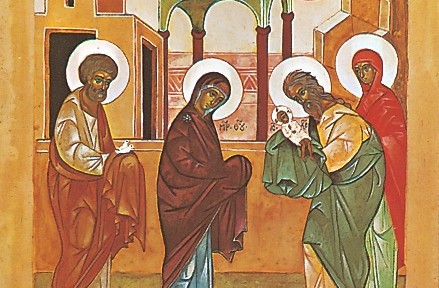On the final day before Great Lent, the Gospel teaches us the importance of reconciliation with one another, of mutual forgiveness. Vespers and Matins for this Sunday sing about the Garden of Paradise, which we lost through the Fall of Adam and Eve. Again, this reminds us that in this world we are exiles, that our true home is in the Eternal Paradise, the Heavenly Kingdom, and that the Paschal Pilgrimage leads us toward our eternal homeland.
Month: January 2017
February 23, 2017 The First and Second Finding of the Precious Head of the Holy, Glorious Prophet, Forerunner and Baptist John
(moved from February 24 according to Typikon)
After the Forerunner was beheaded at the order of Herod and his illicit wife Herodias, his head was discarded in what the Synaxarion calls “an unseemly location,” presumably a privy. According to some, it was secretly recovered by Joanna, one of the Myrrhbearing women, and given honourable burial near Jerusalem. There it was found, through a revelation of the Forerunner, by two monks who had come to Jerusalem to worship at the tomb of our Saviour (the first finding). Putting the head in a bag, the monks returned home. On the way, they met an indigent potter from Emesa. That night the Forerunner appeared to the poor man and instructed him to make off with the relic. He returned with it to Emesa and immediately began to prosper in his business. Just before he died, he put the holy relic in a chest, which he left to his sister with these instructions: never to open it without instructions from the one hidden inside it; and to pass it on to a pious man beloved of God. Thus, the Head of the Baptist passed through many generations, eventually being concealed in a cave near a monastery founded during the reign of Marcian (450-457), whose abbot was the godly Marcellus.
February 19, 2017 Sunday of the Last Judgment (Meatfare); Octoechos Tone 7; The Holy Apostle Archippus
As its name indicates, this is traditionally the final day for eating meat until Pascha. This additional week of abstinence from meat comes from the Monastery of Saint Sabbas, near Jerusalem. The monks are thought to have introduced the practice in expiation for a sin of the Emperor Heraclius when he recaptured Jerusalem from the Persians. But this is a historical matter of no particular importance, and is not even mentioned in the Triodion.
The real theme of this Sunday is the Last Judgment, which we read about in the Gospel at the Divine Liturgy (Matthew 25:31-46). Continue reading February 19, 2017 Sunday of the Last Judgment (Meatfare); Octoechos Tone 7; The Holy Apostle Archippus
February 12, 2017; Sunday of the Prodigal Son; Octoechos Tone 6; Our Holy Father Meletius, Archbishop of Antioch (379-95)
Who does not know this parable from the Gospels? Even non-Christians use the expression “prodigal son.” But how often do we really understand it?
By our sins, but even more by our forgetfulness, we distance ourselves from God and His Kingdom, we go off alone to “a far country.” We waste the talents which God has given us. And we become spiritually impoverished. We begin to be in want. This is unavoidable. We were created for God’s Kingdom, so we are not capable of being truly happy and satisfied anywhere else. But we are afraid to turn to God, so we seek happiness and satisfaction from transitory things which can never satisfy us. Continue reading February 12, 2017; Sunday of the Prodigal Son; Octoechos Tone 6; Our Holy Father Meletius, Archbishop of Antioch (379-95)
February 5, 2017 Sunday of the Publican and Pharisee, Octoechos Tone 5; Post-feast of the Encounter; The Holy Martyr Agatha (249-51)
“Publican” is an old-fashioned word for a tax collector. Since the Publicans in Palestine at the time of Our Lord were collecting taxes for the Roman Empire, and, at times, took an exorbitant commission for themselves, most people held them in low esteem. The Pharisees took great pride in observing every detail of the Mosaic Law to the letter, and looked down on other people who were not so punctilious about it. Continue reading February 5, 2017 Sunday of the Publican and Pharisee, Octoechos Tone 5; Post-feast of the Encounter; The Holy Martyr Agatha (249-51)
February 2, 2017 The Encounter of our Lord God and Saviour Jesus Christ
When the ever-virgin Mary’s forty days of purification were passed, according to the Law of Moses she took her son Jesus to the Temple in Jerusalem, to dedicate him to God as her first-born son. At the Temple, the Lord’s parents offered the sacrifice of a pair of doves (Luke 2:22-23), from which we learn that they were poor, since those who were able were required to offer a lamb. At the Temple, the Lord was met by Zacharias, father of St John the Baptist, and by the aged, righteous Symeon, who had awaited the salvation of God for many years. (Sts. Symeon and Anna are commemorated tomorrow.) We are told that some Pharisees, seeing the child Jesus recognized as the Messiah of Israel, were enraged, and went to tell King Herod. Realizing that this must be the child of whom he had been warned, Herod immediately sent soldiers to kill Him. But the righteous Joseph, warned in dream, fled with the child and his wife, the most holy Theotokos, into Egypt, and they were preserved.
The Feast of the Meeting of the Lord was observed in Jerusalem at least from the fourth century. Its observance was brought to Constantinople by the Emperor Justinian in 542. In the West, it is called the Feast of the Purification of the Mother of God, or Candlemas Day. Continue reading February 2, 2017 The Encounter of our Lord God and Saviour Jesus Christ
